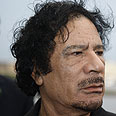
UN Security Council approves Libya sanctions
World against Gaddafi: Despite initial disagreements, United Nations Security Council unanimously approves series of sanctions against Libyan leader and his associates; US urges Gaddafi to step down, saying he has lost his legitimacy
World unites against Gaddafi: The United Nations Security Council approved Sunday a series of sanctions against Libyan leader Muammar Gaddafi.
The sanctions include travel bans on Gaddafi and senior officials in his regime and the freezing of their assets. The resolution also calls for transferring the handling of Gaddafi and his associates to the International Court of Justice in The Hague on suspicion of war crimes.
All 15 members of the Security Council voted in favor of the resolution.
Earlier, both US President Barack Obama and Secretary of State Hillary Clinton called on Gaddafi to step down, saying he had lost the legitimacy to rule.
Obama said in a conversation with German Chancellor Angela Merkel that "when a leader's only means of staying in power is to use mass violence against his own people, he has lost the legitimacy to rule and needs to do what is right for his country by leaving now," the White House said in a statement.
Clinton remarked, "We have always said that the (Gaddafi) government's future is a matter for the Libyan people to decide, and they have made themselves clear." She added that Gaddafi "has lost the confidence of his people and he should go without further bloodshed and violence."
Clinton added that she was working with partners to determine how to provide humanitarian aid to Libyans in need.
Disagreements ahead of vote
Saturday evening Security Council members were still divided over whether to refer the Gaddafi regime's violence to the war crimes court. In an attempt to break the deadlock, Libya's UN delegation, which has denounced Gaddafi, sent a letter to the president of the Security Council, Brazilian UN Ambassador Maria Luiza Ribeiro Viotti, confirming its support for an immediate ICC referral.
Libyan UN Ambassador Abdurrahman Shalgam wrote to Viotti that his mission "supports the measures proposed in the draft resolution to hold to account those responsible for the armed attacks against the Libyan civilians, including through the International Criminal Court."
The council has previously referred only one other case to the ICC: the conflict in Sudan's western Darfur region. The court has indicted Sudanese President Omar Hassan al-Bashir for genocide and other crimes against humanity in Darfur.
France and Britain drafted the six-page sanctions resolution, which as noted calls for travel bans and asset freezes for Gaddafi and his inner circle, in consultation with the United States and Germany.
Foreigners flee Libya
Both France and Britain evacuated citizens from Libya Saturday, with France announcing towards evening that it was shutting its embassy down and Britain using C-130 Hercules planes to carry Britons and other nationals, to Malta
Earlier, British UN Ambassador Mark Lyall Grant told reporters before entering the council chamber that he was "encouraged by the broad agreement" among the 15-nation council members on the main points in the draft, though he said there were several outstanding issues, including the ICC referral.
French Ambassador Gerard Araud told reporters before the council meeting that the ICC was the main sticking point and suggested they would have to find a compromise. France and Germany have been lobbying hard to immediately bring the Libyan violence to the ICC, based in The Hague.
Permanent veto-wielding council members the United States, Russia and China are not members of the ICC and view the permanent war-crimes tribunal with suspicion. But diplomats said privately that Washington was advocating the ICC referral while Moscow could live with it or without it.
The sheer numbers of foreigners leaving Libya as Gaddafi's regime attacks anti-government protesters has been staggering. As of Saturday, at least 16,000 Chinese, 15,000 Turks and 1,400 Italians had been evacuated, most working in the construction and oil industries.
In addition, UN Secretary-General Ban Ki-moon told the Security Council that some 22,000 people have fled across the Libyan border to Tunisia and another 15,000 crossed the border into Egypt.
AP and Reuters contributed to this report
- Follow Ynetnews on Facebook










